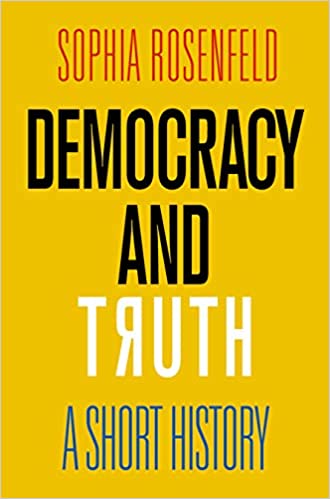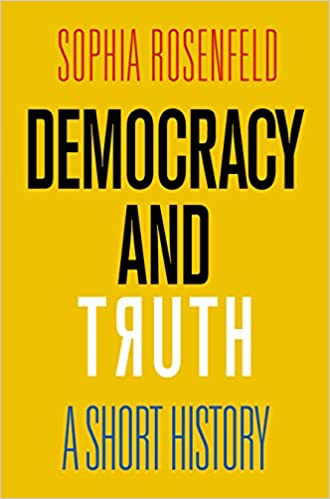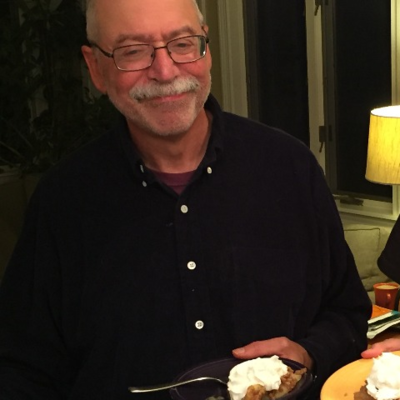Sophia Rosenfeld, Democracy and Truth: A Short History


Sophia Rosenfeld, Democracy and Truth: A Short History ( University of Pennsylvania Press, 2019)
When the great 17th Century rationalist philosopher Gottfried Wilhelm Leibniz was a mere Junge of 19, he wrote a dissertation on the “combinatorial arts” in which he contemplated the building of a machine that would “answer all questions” and “resolve all intellectual disputes.” He apparently got this idea from Raymundus Lullus (Ramon Llull), a 13th Century monk and alchemist who believed that his own combinatorial, pseudo-algebraic system, Art , could be used to prove every correct Christian doctrine–and to refute all heresies. The idea of a geometrical model that would yield important truths about the world also seduced Leibniz’s fellow rationalists, Descartes and Spinoza, but Leibniz was the only one of the three who believed, at least in his youth, that a machine could be built that would take in all the ideas that anybody ever had or might have, and by arranging and mixing them up correctly, spit out every important truth and not a single falsity. (While Leibniz never got around to engineering his “Great Instrument of Reason,” he did later manage to construct a working arithmetic calculator.)
One reason for the attractiveness of a truth machine is that so many arguments–and wars–have resulted from disagreements about what is true. In her captivating book on the uneasy relationship between democracy and truth, Rosenfeld makes an important distinction between three types of propositions that people have found a lot of time to argue about: religious/philosophical, mathematical/logical, and empirical/factual. Following Voltaire, she doesn’t worry too much about the second group: while the bickering has been nearly unceasing on any number of mathematico-logical issues, not too many people have died arguing about squaring the circle. But the other two groups–the ones for which Leibniz’s later arithmetic calculator could give no help–have been responsible for millions of deaths (as well as numberless unpleasant dinner parties). Interestingly, the areas of deadly disagreement don’t always follow the well-known fact/value dichotomy, even if every decision to call out the military must always involve judgments about what matters and what ought to be done about it
.Rosenfeld points out that there is an important dimension of Enlightenment thought that revolves not around the often quite extreme rationalist or empiricist attitudes on display in Europe during the 17th and 18th Centuries, but rather on the notion of expertise. Whatever truths may or may not have been derivable from combinatorics–or for that matter, from astrology, alchemy, or the nascent “hard sciences,” it is often only the cognoscenti who have access to these treasures. The rest of us will just have to wait to be informed—if any of the sages should feel like disclosing their secrets. And perhaps what they deign to report will be false. Rosenfeld tells us (though perhaps we should have already known this from Shakespeare) that lying for political purposes is hardly new. In fact, George Washington complained about the gazettes of his day teeming with misrepresentations and “malicious falsehoods.” But she suggests that “the idea of objectivity in news reporting…is historically anomalous and a relatively recent invention.” Given The Pentagon Papers, Watergate, cover-ups during the Reagan and Clinton Presidencies, and dissemination of invasion-producing falsehoods by the G.W. Bush Administration, nobody should be too surprised about the constant claims of “hoax,” “fraud,” or “lies and lying liars” that now populate our daily news feeds. Even the idea that we are now living in a “post-truth” era may itself be a bit of “hyperreality,” since it’s unclear that there was ever a veracity epoch. And Rosenfeld argues that since “the barest facts require interpretation, or assessments of their implications in light of other ideas or values, even such apparently empirical matters as whether the American Civil War was fought over slavery is unsurprisingly controversial.” Of course, determining what we should do involves value judgments, which can never be derived solely from facts about what happened. But that realization only makes things worse: it means that even in those increasingly rare instances where everybody can agree on what went down, we can almost never make any headway regarding what should be done.
Rosenfeld’s attitude toward postmodernism fluctuates a bit throughout the book. She doesn’t want to “plunge fully into the waters of postmodernist relativism” but she also doesn’t think much of the attacks on that school made by right-wing pundits. No postmodern thesis on truth is ever set forth with any particularity here, but the entire approach is claimed not to be nearly as dangerous as many think, and, in any case, to be much more nuanced than its smirking critics give it credit for. I’m no expert on postmodernism myself, but the analytic, anglophone wing of philosophy on which I cut my teeth has its own mountains of literature on the existence of facts, the nature of truth, metaphysical vs. internal realism, correspondence, Tarski, disquotation, etc., etc. If there is anything of interest that I have ever thought or said on any of those matters, it can be found in a long paper in my book on Everett Hall. So, I won’t gum up this essay with my views on any of them, except to say that Rosenfeld, a historian by training, isn’t always entirely consistent on the more strictly philosophical issues.
For example, facts, if they exist at all, should never be conflated with true propositions or sentences which assert them. There can thus be no “false facts” or “fake facts”; only false utterances, beliefs, statements, etc. Again, she writes that “empirical facts are always ultimately dependent on others in the role of witnesses because they can’t be shored up by reason alone.” But it’s not the facts that need shoring up, but the evidence that this or that claim about the world is accurate. When Rosenfeld concludes her book with the thought that “truth, like democracy, isn’t something that simply exists in the world, [but] is, rather, something that we must always consciously and collectively forge,” it’s hard to know precisely what she’s asserting, because statements about “truths” are so often ambiguous. They can refer to true assertions–and, taken that way, Rosenfeld’s remark is correct (except, perhaps, for the “consciously” which doesn’t seem necessary to me). But “truths” is also often used, including by Rosenfeld herself, to designate the facts themselves rather than anything anybody thinks, says, or writes about them; and on that interpretation, people can “forge” (consciously or unconsciously, individually or collectively) only those facts in which they happen to participate. The great majority of them don’t involve human beings at all. In a word, if one wants to be coherent, it is crucial to carefully distinguish BEING from BEING KNOWN.
Returning to ground on which Rosenfeld is steadier, her book is particularly engrossing on the centuries-old tension between “experts” and “common folk.” She reminds us of Foucault’s differentiation of societies by the groups therein who are given the authority to say what is and what is not true. And, relying on historians Steven Shapin and Lorraine Daston, Rosenfeld notes the connections that started to be made in Seventeenth Century England between class membership and credence. Access to knowledge, like that to wealth and most of the other good stuff lying around, was for the elite only. But even this was slightly democratizing, for according to leaders as diverse as Machiavelli and Frederick the Great, nobody but an absolute sovereign should be trusted to know anything of importance. Thus, expansion to the aristocratic class was a necessary first step toward any sort of self-government. As sources of knowledge gradually spiraled outward, the idea of a broader democracy came to seem less and less absurd. And in the Eighteenth Century, such seductive thinkers as Rousseau and Paine began to make fairly wide suffrage sound reasonable.
Hannah Arendt, a particular favorite of Rosenfeld’s, saw the new “zeal for truthfulness” to be one of “the distinctive hallmarks of modernity.” For if access to truth is paramount, and numerous people have it, “the wisdom of the crowd” can arise. But if it was grudgingly allowed that “common folk” had some quite limited understanding (of the mundane world only), it was still only the rich and their appointees–the highly educated scientists and cultured civil servants–who could be trusted on important matters. And the divvying up of responsibility here–Who is to have the final word, and if this authority is to be split, who gets what sorts of truths?–has been a nearly constant source of headaches. (Those interested in what I take to be the appropriate manner of parsing here should have a look at my book on democratic theory, where I deny that elections either are or ought to be truth-tracking except in one specific area. What must be yielded to the entire demos is no more and no less than what is wanted by a citizenry, and that is what their polity should therefore seek–whatever else may or may not be the case.)
Rosenfeld’s history indicates that searching for indisputable roads to truth did not cease with the rationalists. For example, at various times both the existence of free speech and the supremacy of plain speech have been claimed to be not just essential but sufficient for getting to the heart of political (as well as religious and philosophical) matters. If plain truths are necessarily more persuasive than falsehoods, the combination of unrestricted quantity and perfect perspicacity really would seem to be enough. As Madison wrote in the 1790’s, “in a Republic,” [where, presumably speech will be both free and forthright] “light will prevail over darkness, truth over error.” But even if the knowledge eddies were gradually edging outward, such leading Enlightenment figures as Kant and Voltaire were as uncomfortable as Madison’s confreres were in giving the uneducated masses too much input. Not only were the masses considered ignorant, they were also thought to be much more likely to fib when it was in their interest. As Roger Sherman put it, “the people…should have as little to do as may be about the Government.”
One might have thought that the Progressive era would have been the dawning of the age of “the people.” Instead, many Progressives were seduced by the ideas of administrative excellence and the efficiencies that could be delivered by both the physical and social sciences, and they became skeptical of the idea that one could get good management teams by electing them. As a result, many Progressives actually liked the idea of a professional bureaucracy. So, it was not yet the age of Capra’s John Doe; but that day was coming.
There was, perhaps, a Deweyan, universal-education moment when science and “common sense” were each thought to have their own contributions to make to public policy. But, sadly, with no clear idea how to render all and only what is owed to expertise (since the prudential-value key had not yet been noticed), “the people” (including, FINALLY both Blacks and women) not only got the vote, but grew a significant subset with the idea that expertise (so-called) was dangerous and had to be generally suppressed. After all, can’t scientists, with all their weird calculating squiggles and test tubes, just make up perils like “global warming” or “acid rain”--either to enrich themselves or to benefit their governmental or corporate masters? Can’t they be nothing but technocrats who not only “ignore ordinary people’s conceptions of and desires for the world” but also “mislead them about their options?” Surely such fears and resentments might cause “ordinary people…to stop putting any stock in expert voices of any kind, seeing all of them as hacks or phonies speaking only for themselves and their partisan, financially interested cronies.” After that sort of fear percolates for a while, it may come about that nothing and nobody with any sort of credential will be trusted. Certainly not scientists, academic institutions, newspapers, or government agencies. Even our eyes cannot be trusted, if what they’re taking in are images that have been placed on a TV screen by a giant media company. It seems clear that without the above-mentioned distinction available to help theorists tell exactly what matters really SHOULD be left to “the common folk” and which to experts, it’s really not so surprising that populists should have grown fond of the idea that the less educated one is, the more one should be trusted about, well, anything. As juries of “peers” have long been seen to be the best determiners of truth and falsity in criminal and civil cases, why shouldn’t regular people also be deemed to be the best judges of whether a hot spell is the result of human-caused climate change, or whether horse and dog medication for heartworm is the best possible treatment for coronavirus infections?
That, in a word, is where Rosenfeld finds much of the world at present. Experts lined up in opposition to regular people. Know-it-alls on one side, know-nothings on the other. Making things worse is that it’s not always easy to see who is up to what mischief. She notes that “the appeal to the wisdom of the people was always used as much by wealthy politicians, industry leaders, and intellectuals, all claiming to speak for the masses and to defend them from other undemocratic elites, as it was by veritable ordinary people. It also blended when needed (just as the discourse of expertise did) with just about every important ideology of the era, including nationalism and socialism.” And, obviously, where nobody can be trusted and everyone is afraid of being duped, democracy can’t work very well. Because…well, why wouldn’t the other side cheat with respect to election results too? Are we supposed to think they’re above that?
To the extent that Rosenfeld offers suggestions for improving the situation in the U.S., they are much like those found in Rick Hasen’s new book on “Cheap Speech,” (the Hornbook review of which can also be found here at 3:16 AM.
They involve changes in campaign finance laws, suggestions for inducing social media giants to tell the truth more and encourage angry echo chambers less, the bolstering of credentialed journalism, and the like. Rosenfeld is more interested in what she takes to be the detrimental effects on democracy of wide income disparity than Hasen is, but is less specific about how particular remedies might be drafted or their chances of success in the current legal environment. It is clear who is the lawyer, who the historian. In sum, Democracy and Truth is an enjoyable and informative book. In this reviewer’s opinion, its author hasn’t QUITE navigated her way to the clear light, but there is an advantage in that. For on reaching that once desperately hoped-for Valhalla, one is bound to find that the substantial democratic reforms that are so brightly illuminated there are about as close to being enacted somewhere in the world as Leibniz’s truth generating machine is to moving into beta testing.

About the Author
Walter Horn is a philosopher of politics and epistemology.
His 3:16 interview is here.